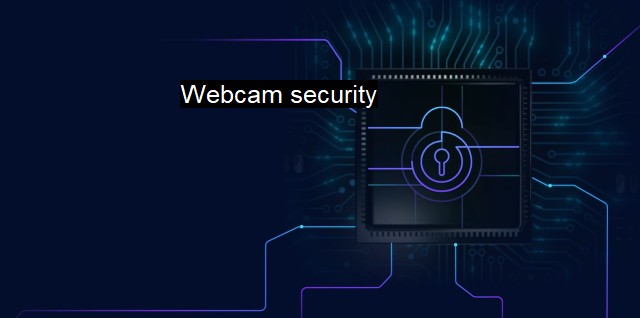What is Webcam security?
The Importance of Webcam Security: Protecting Your Privacy and Safety Online
Webcam security is a significant facet of cybersecurity that focuses on the protection of webcams from unwanted intrusions, unauthorized use, and cyber threats. webcams are a common feature in laptops, tablets, and smartphones that allows users to make video calls, take pictures, and perform other tasks. due to their accessibility, webcams have also become a target for cybercriminals aiming to collect personal information, conduct surveillance, or even blackmail users, making webcam security ineffaceably important.Webcams, like any other device that communicates over the internet, operate using a unique IP (Internet Protocol) address. This IP address is susceptible to hacking attempts. Cybercriminals could seize control of the webcam, enabling them to record videos or take photos without the user's knowledge or consent. The footage acquired through hijacking a webcam can be used maliciously, leading to a colossal invasion of the victim's privacy.
Webcam security involves several measures to safeguard webcams from such undesirable intrusions. These measures involve the use of advanced antivirus software, setting secure passwords, regular updating of the device's software, and even physically blocking the webcam when it's not being used.
One key part of webcam security is the use of antivirus and cybersecurity software. These software work by scanning and monitoring your computer for malicious programs or viruses that could gain control of your webcam. Some of these software come with features that allow them to identify and block any software trying to gain unauthorized access to the webcam. For privacy-conscious individuals who dread the idea of unwanted eyes on their private life, using a reliable antivirus helps to keep their fears at bay.
Passwords play a crucial role in maintaining webcam security. A default password that comes with a webcam on purchase is often simplistic and hence easily guessable. Changing these default passwords to complex and tricky passwords is a confirmed preventive measure against cyber threats. It's also crucial to regularly update these passwords for enhanced security.
Also pertinent to webcam security is the frequent updating of the webcam software. These updates often come with recent security patches that cover loopholes hackers might exploit. By keeping a webcam's software up-to-date, users can protect themselves against attackers who prey on outdated software vulnerabilities.
Beyond the aspect of digital security, certain physical measures add a valuable layer of protection to the security of webcams. Privacy screens or webcam covers can prevent undesired visual access. These physical barriers, though not a replacement for software protection, act as a guaranteed shield against prying eyes.
The potential for abuse and misuse of webcams has grown over the years. Given increased remote work, virtual meetings, and online schooling, webcams are frequently used, and consequently, opportunities for cybercriminals to exploit vulnerabilities have multiplied. The compromise of one's webcam can lead to serious invasions of privacy and security threats, making webcam security ever more crucial.
It's paramount not to underestimate the importance of webcam security. Cybercriminals are evolving their methods to break into new technology and exploit vulnerabilities, and hence, businesses and individuals need to ensure their webcam security is robust and up to date. By using comprehensive cybersecurity measures, such as reliable antivirus software, users can be confident about their webcam's security.
Effective webcam security is a combination of vigilance, strong passwords, and utilization of updated antivirus protection. Adopting these measures will not only provide an enhanced level of security but also ensure peace of mind for users, given that they are safeguarded against unintended privacy violations, be it online or offline. The continuous development of technology must be matched equally by steadfast efforts toward securing privacy through potent cybersecurity practices, including sound webcam security.

Webcam security FAQs
What is webcam security and why is it important?
Webcam security refers to the measures taken to protect your webcam from being compromised by cybercriminals. It's important because hackers can use your webcam to spy on you, steal your personal information, or even conduct criminal activities.What are some ways to secure my webcam?
Here are some ways to secure your webcam: 1. Cover your webcam when not in use 2. Install antivirus software with webcam protection 3. Use strong and unique passwords for all your accounts 4. Update your operating system and software regularly 5. Avoid clicking on suspicious links or downloading attachments from unknown sources.Can hackers still access my webcam if I have antivirus software installed?
Although antivirus software can provide an extra layer of protection for your webcam, it's not foolproof. Cybercriminals can find ways to bypass antivirus software or exploit vulnerabilities in your system. That's why it's important to practice good cyber hygiene and take additional measures to secure your webcam.What should I do if I suspect my webcam has been compromised?
If you suspect your webcam has been compromised, the first thing you should do is disconnect it from your computer or disable it in your device's settings. Then, run a malware scan on your system using antivirus software. Finally, change all your passwords and monitor your bank accounts and credit card statements for any suspicious activity. If you're still concerned, contact a cybersecurity professional for assistance.| | A | | | B | | | C | | | D | | | E | | | F | | | G | | | H | | | I | | | J | | | K | | | L | | | M | |
| | N | | | O | | | P | | | Q | | | R | | | S | | | T | | | U | | | V | | | W | | | X | | | Y | | | Z | |
| | 1 | | | 2 | | | 3 | | | 4 | | | 7 | | | 8 | | |||||||